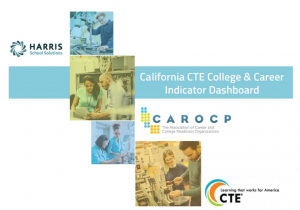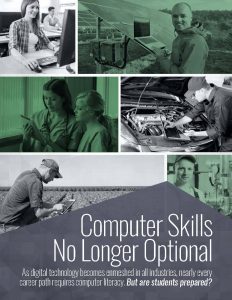Earlier this month, we held the 2017 Advance CTE Spring Meeting, which brought over 200 participants from across the country together to dive into all things CTE. From digging into new research to updates on federal policy, hear what our staff had to say as they reflected on this year’s meeting in this three-part series.
This year’s Spring Meeting was one of Advance CTE’s largest to date, and featured a strong, forward-looking agenda that covered the biggest issues in CTE today. We had not one – but two keynote speakers and a range of panels and small group discussions designed to support leaders in strengthening their state systems and increasing access and opportunity for all learners.
More than 200 national, state and local leaders came together from across the country, including 41 State CTE Directors. We saw attendees – many of whom are Advance CTE members – from 48 states, D.C. and the U.S. Virgin Islands. This great turnout is a personal point of pride for me as the staff person in charge of our professional development offerings and member engagement.
It also makes me excited for our future meetings. Starting on July 1, the Advance CTE state membership will expand to include up to five individuals. So far, 41 states have exercised this new member benefit, which will cover 136 additional individuals along with the State Directors. Nearly two-thirds of these individuals are new members of Advance CTE, and hail from across the continuum of CTE.
The prospect of these new members make it an exciting time to be a part of Advance CTE, and bring with them the opportunities for us to connect members based on their role in CTE to bring new dimensions to the cross-state sharing and networking that is the cornerstone of our organization.
Not yet a member? Today is the perfect day to join “the family”! Member benefits include discounted meeting registration, which you can use at our next in-person meeting.
We hope to see all of you October 16-18 at our Fall Meeting at the BWI Marriott just outside Baltimore, Maryland!
Andrea Zimmermann, Senior Associate, Member Engagement and Leadership Development
Over the past few weeks, I have had the great pleasure of interviewing our 11 Excellence in Action award winners about their amazing programs of study, bringing their applications to life (you can read the two-pagers we created for each program based on their interview here). What is clear is that every program is led by dedicated and enthusiastic educators and administrators that deliver innovative and rigorous programs of study uniquely tailored to their students. These programs provide their students with the ability to find their passions while still in high school, all while earning credits, certifications, and networking with employers.
Earlier this month, we honored these 11 programs at our awards ceremony during the 2017 Spring Meeting. Hailing from 10 states and spanning 11 Career Clusters, they collectively serve over 1,500 students by providing high-quality programs that prepare learners for future success in their education and career goals. 25 program leaders representing education and industry came from as far as California to be recognized by Advance CTE and the over 200 state leaders in attendance.
State CTE Directors introduced each program, and recognized them for seamlessly combining academic coursework and real-life, hands on experiences with industry experts; supported transitions from secondary to postsecondary education, all backed up by incredible data. I encourage you to read more about each program, and look to them as models in the country.
Katie Fitzgerald, Senior Associate, Communications


 year’s graduates to really be ‘college and career ready?’” To answer that question, we first must decide what, exactly, that phrase really means.
year’s graduates to really be ‘college and career ready?’” To answer that question, we first must decide what, exactly, that phrase really means. experience. Practical-skill attainment based on robust CTE Programs of Study can lead to increased student engagement. Industry credentials can be earned before a student graduates from high school.
experience. Practical-skill attainment based on robust CTE Programs of Study can lead to increased student engagement. Industry credentials can be earned before a student graduates from high school. nly happens if we, as CTE educators, commit our time, resources, and energy to ensuring “college and career ready” stands for something more than just words – we must translate it into numbers.
nly happens if we, as CTE educators, commit our time, resources, and energy to ensuring “college and career ready” stands for something more than just words – we must translate it into numbers. to mechanic’s shop, or in a tractor on a farm.
to mechanic’s shop, or in a tractor on a farm. skills in the issue brief that will be included in your Advance CTE Spring Meeting conference bag.
skills in the issue brief that will be included in your Advance CTE Spring Meeting conference bag.
 Join us May 2 – 4, 2017 in Washington, D.C. four our annual Spring Meeting bringing together Career Technical Education (CTE) leaders from across the country for two and a half days of panels, breakout sessions and networking opportunities. This year’s meeting will feature over 25 leaders in CTE tackling issues from Perkins reauthorization to expanding access to CTE in rural communities.
Join us May 2 – 4, 2017 in Washington, D.C. four our annual Spring Meeting bringing together Career Technical Education (CTE) leaders from across the country for two and a half days of panels, breakout sessions and networking opportunities. This year’s meeting will feature over 25 leaders in CTE tackling issues from Perkins reauthorization to expanding access to CTE in rural communities.
